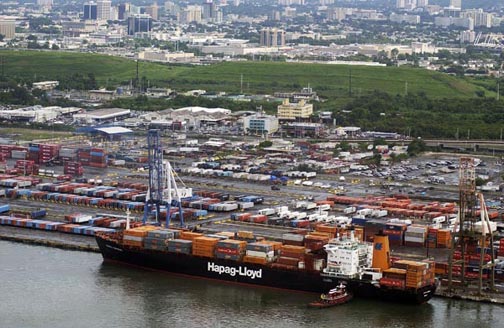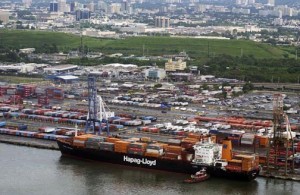Treasury pushes back start of IVU collections at ports


The information was part of an announcement by the agency of the availability of a notice offering details of how the IVU will be charged on tangible goods imported for use and consumption in Puerto Rico, and how the agency is preparing to enforce the tax. (Credit: © Mauricio Pascual)
The Puerto Rico Treasury Department has pushed back the start of collections of Sales and Use Tax (known as IVU in Spanish) for merchandise coming through the island’s ports by a month, to Aug. 1, agency officials said Monday.
The information was part of an announcement by the agency of the availability of a notice offering details of how the IVU will be charged on tangible goods imported for use and consumption in Puerto Rico, and how the agency is preparing to enforce the tax.
Furthermore, the agency also announced the upcoming filing of a bill at the Legislature containing technical amendments to the laws regulating IVU collections that are needed to ease the process and establish the reach of the clauses related to declaring imports, paying the tax, managing re-seller credits, and how importer traders must go about obtaining guarantees.
The draft amendments also propose delaying the start of collections to the Aug. 1 date.
“This will facilitate the internal process of transitioning to the new system, and will allow the [agency] to conduct an educational campaign aimed at merchants and the general public, and in turn, will allow merchants to conduct the internal changes necessary to comply with the new Code provisions. It also proposes that the Monthly Sales and Use return is filed by legal entity and not by retail establishment,” Treasury Secretary Melba Acosta said.
The notice that is available online also explains that the agency is preparing new regulations for the IVU to “simplify its management and facilitate the interpretation and enforcement of its provisions by taxpayers, merchants and tax advisers.”
The document is expected to contain all of the previously issued rulings, updated to reflect amendments to the IVU code since its implementation in 2006. The ruling will be released later this month for public comment, Acosta said.
Updated procedures
The notice also includes information about updates to “critical procedures” at the agency related to reporting and paying IVU, with the goal of making imported property pick-ups easier and faster, while ensuring that taxpayers meet their responsibilities.
Among the procedures to facilitate clearance at the point of entry and improve oversight, the agency is establishing a new control system at the ports. To allow for fluidity and continuity to the current process, Treasury has split the implementation of the new control system in two phases: Modernizing filing and payment procedurs and updating the manifesto electronic transmission system.
In the first phase, to be ready for the August 1, 2014, the agency is modernizing the process of filing and paying the IVU on the introduction of the taxable items to make it easier for taxpayers. The declaration could be filed and paid electronically, eliminating the need the taxpayer has to go personally to the agency to complete this process. If in compliance with the required documentation and payment, they will receive the authorization of release of goods automatically.
The agency will orient merchants on the changes during this month.
During the second phase, the agency will be updating the manifesto electronic transmission system and integrating changes implemented during the first phase. Once completed, the agency will publicly inform on the new procedures and requirements to transmit manifestos.
With that update, the agency will be cutting back on the need for paperwork and promoting faster processing times.
“It is important to note that the declaration is only part of the process for the release of imported property and the importer must comply with the filing of a new tax return called the monthly use tax on imports return, plus the monthly sales and use tax return, which are required from all merchants,” Acosta said. “To this end, the Department is revising and improving the electronic filing system of this form to facilitate its filing and payment, and that they can promptly claim credit for taxes paid by merchant resellers.”
The agency has also developed a new process to manage such credits, and will be informing merchants through July of the changes, she said.














I am concerned that this whole system of detaining merchandise at the port until the importer obtains the “release of goods” for a shipment that is arrested and detained by Hacienda may in the future be declared unconstitutional in Federal court for impeding the free-flow of interstate commerce. While many may say that it’s constitutional (the same lawyers that said the retroactive application of pension reform on judges was constitutional and perhaps the same Associate Justice nominee that said the “cateo patrio” was constitutionally permissible), many lawyers believe that it is not. Would it be constitutional for the state of New Jersey to set up a tax-collection station in the middle of the George Washington bridge? That would fail almost instantly. Detaining merchandise at our ports for non-security reasons for more than a few minutes may very well also fail. While litigating, I can almost hear proponents warning that if the court rules against the government, it will be creating a massive deficit. Actually, the risk of creating such massive deficit has its roots in legislating a tax-collection mechanism over constitutional quicksand.
Once again, we’re building a massive revenue stream upon shaky constitutional ground.
This new tax attracted the attention of Hot Air, a very large political blog in the States, which opined that “like every other tax this government has imposed or plans to impose, in spite of how it is marketed it will in the end be additive rather than replacement. Even as the original IVU did not replace but rather augmented the arbitrios system as was promised, so this new tax will just be a 7% raise, but a hidden one, in the price the end consumer pays.” I fear they are right.